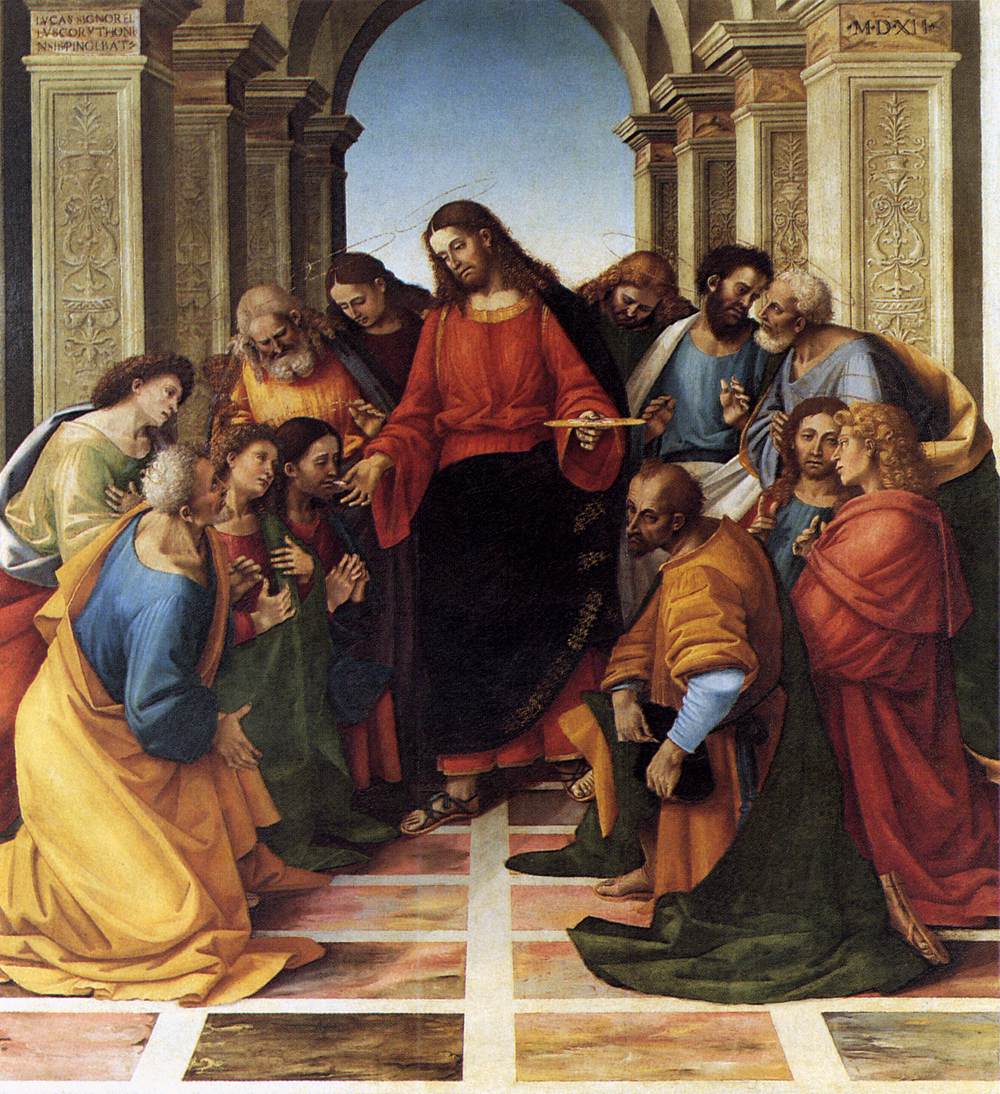This Sunday we listen to the fifth and last passage of chapter 6 of the Gospel according to John.
In past Sundays, the Church has been presenting us with segments of that chapter in which Jesus expounds and develops his teaching about the need to believe in him and to eat his Body and drink his Blood in order to attain eternal life.
In this last passage, the resistance of some of those who listen to him reappears.
Jesus’ statement that his flesh must be eaten is unacceptable to them.
Jesus says: “My flesh is true food and my blood is true drink”.
But his hearers react with these words, “This manner of speaking is intolerable; who can admit that?”
I believe there are several levels of resistance.
A first level is toward Jesus Himself and His statement that eternal life is obtained only through Him.
How can a man be the mediator of eternal life if that can only be done by God?
They do not know or do not want to admit that Jesus, besides being man, is also God; they are left with the human and historical dimension of Jesus, and it seems to them that his claim to be the mediator of eternal life is excessive and even blasphemous.
But that is why the eternal Word of God became flesh: to be the means through which the Father grants us to participate in the divine life that lasts forever.
The second level of resistance refers to the sacrament.
The idea of eating the flesh and drinking the blood of Jesus Christ is unacceptable, because the listeners are not able to understand that this food and drink is sacramental and not physical.
A cannibalistic ritual with the physical body of Jesus would be sufficient for only a few and not for all believers of all times.
He who keeps his gaze and his references circumscribed to the realities of this temporal world cannot understand the spiritual realities that last forever.
Jesus answers, above all, the first objection, which He considers fundamental: “Does this scandalize them? Does it scandalize them that I said that eternal life is obtained through me? Does it scandalize them that I say that I am the bread that gives eternal life? What would it be if they saw the Son of man ascending to where He was before?”
If they do not want to admit that Jesus comes from God, He explains, what will they think or say when they see Him return to the Father, to heaven, from whence He came in the first place?
His interlocutors have no answer to these questions from Jesus.
He expands his explanation: “It is the Spirit who gives life; the flesh profits nothing”.
That is to say, those who keep their gaze and their references circumscribed to the realities of this temporal world cannot understand the spiritual realities that last forever.
That is why Jesus tells them: “No one can come to me unless the Father grants it to him”.
That phrase means that unless our mind transcends the horizon of the realities of this world and this time, we will not be able to understand not only what Jesus explains in this chapter, but nothing of what He says and the New Testament teaches.
The teaching of Jesus, of the Gospel and of the entire New Testament is that salvation and the destiny to which God summons us are in another dimension that transcends this world and this time.
And from now on our minds and hearts must be open to that dimension.
From then on, the evangelist goes on to explain, many of his disciples turned back and no longer wanted to walk with him.
It is important to note that those who withdrew from Jesus because of this teaching were not the Jews who had previously been reluctant to believe in him.
Those who recanted and withdrew were many of his disciples, that is, people who had previously followed him, but who, as they came to know the innermost identity of Jesus and his claim to be the mediator of eternal life, withdrew and stopped following him.
It still happens today that many people, who grew up as Catholic believers, when they reach a certain age, when they have university experience, or when they enter the world of work, become blocked, become resistant to the faith and abandon religious practice and the Church.
It is not true that studies make a person an unbeliever, because there are many educated and qualified people who are believers.
There are even people who were not believers, who became interested in studying and understanding Catholic theology and the historical criticisms of the Church (such as the Inquisition, the Crusades, the conquest of America, or the immoralities of the clergy) and, upon learning the truth, they became Catholics.
Whoever is interested in the faith, reads and studies the fundamentals that those of us who believe will discover that there are more powerful reasons to believe than not to believe.
It is much more reasonable to believe than not to believe.
But in our world it seems to be a badge of honor to say that one no longer believes, as if faith were a children’s story that, as one grows up, one ceases to take seriously.
It is much more reasonable to believe than to stop believing.
Jesus then clearly poses the request to his Twelve disciples, to his closest ones, to his followers: “Do you also want to leave me?”
Simon Peter, on behalf of his companions, gives the answer of faith: “Lord, to whom shall we go? You have the words of eternal life; and we believe and know that you are the Holy One of God”.
We cannot remain indifferent to the person of Jesus.
We have to make a decision.
There have been times when the culture had a Catholic religious imprint and one came to the faith by tradition; one received the faith in the family, learned to live as a believer and participated in the liturgy and religious traditions with joy.
Still, one had to understand and study at least the rudiments of the catechism to know what we believe and how we should live.
In this present age of a de-Christianizing society, the choice of faith requires knowledge and decision.
Following Jesus is not an obligation, it is an act of freedom.
Each person has his or her own personal process.
Some will require more study, examination and knowledge; for others, the experience of the liturgy or prayer will be sufficient argument for belief.
But whoever locks himself up in this world as the only real thing there is, excludes himself from the option of faith from the outset.
Jesus’ question also has another implication: faith is free.
“Do you also want to leave me?”
Following Jesus is not an obligation, it is an act of freedom.
Peter answers, “Lord, to whom shall we go? You have the words of eternal life; and we believe and know that you are the Holy One of God.”
You alone have words that give meaning to life; you alone lead us to God.
To whom shall we go?
There is no other on earth who will give us the eternal life that You promise.
May we too be able to respond as Peter did: “We believe and know that you are the Holy One of God”.
You are the Savior whom God has sent us to lead us to the light that rejoices us and gives us meaning.
Msgr. Mario Alberto Molina, OAR
The image accompanying this text is from the painting The Communion of the Apostles, by Luca Signorelli.
Painted in 1512, it is in the diocesan museum of Cortona.


